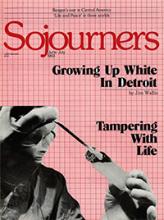It was nearly noon on Good Friday. With feelings of both expectancy and trepidation, we were about to call Chicago again. This moment was the culmination of nine long months of waiting and working toward the purchase of an abandoned house on Girard Street that would become Sojourners' neighborhood center. Calls to the house's owner in Chicago had increased in the last few weeks as his signing of the settlement papers had been delayed over and over.
In our eight years in inner-city Washington, D.C., Sojourners community has never had its own space for local ministries. Daycare for children, housing work, a food co-op, and emergency food distribution have all taken place in rented space or our homes. This has restricted the scope of our ministry and made it difficult for our neighbors to identify us as a church.
We often find that we cannot store all of the food given to us for emergency distribution. We do not have space for large tenant meetings with our neighbors, and our neighborhood prayer and Bible study are confined to our small living rooms. We have no private offices for hearing tenants' housing problems or receiving commodity food applications, or a center for building on relationships with neighborhood children that began at summer camp. A major factor in the closing of our day-care center was the excessive rent we paid for its space, and now we are losing the three-room basement apartment that houses our neighborhood offices and the Southern Columbia Heights Tenants Union because the building above it is being sold.
As our neighbors experience an expanding crisis brought on by the government's abandonment of their needs, we have been forced to face the crisis with shrinking space for ministry. Thus, the house on Girard Street came to represent not only our dreams but also the key to our deeper involvement in our city and the struggles of the poor. But it felt like a birth that would not happen.
Read the Full Article

